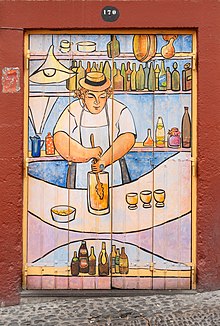Poncha
The poncha is the traditional drink in Madeira . It typically consists of Aguardente de cana-de-açúcar , a Madeiran brandy made from fresh sugar cane juice, bee honey (rarely molasses or cane sugar ) and local lemons in a varying mixing ratio of around a third.
The poncha is traditionally mixed with a special whisk called "Caralhinho", which is often hung over the counter in poncha-specialized restaurants.
origin
Like punch , the name comes from the Indian term for "five".
In the 19th century, Madeira Poncha was a common drink among Madeiran families.
The drink is said to have its origin in the efforts of Portuguese sailors in the 16th century to preserve lemons as a remedy for scurvy during long sea voyages. The sugar cane brandy, which has been produced in Madeira since the end of the 15th century, was added to the lemon. The addition of high percentage alcohol to Madeira wine or port wine pursues similar approaches .
Protected geographical designation of origin
In March 2014, the Portuguese government granted the “Poncha da Madeira” the status of a protected geographical designation of origin and regulated its production and marketing. Thereafter, this designation may only be used for products from the islands of Madeira and Porto Santo . Sugar cane brandy from Madeira must be used as alcohol. The overall product must correspond to the traditional sensory properties of Madeira.
variants
In addition to the drink made using lemons (regional poncha), variants with orange or passion fruit juice are mainly offered to tourists . As a souvenir, Poncha is also available in bottles.

